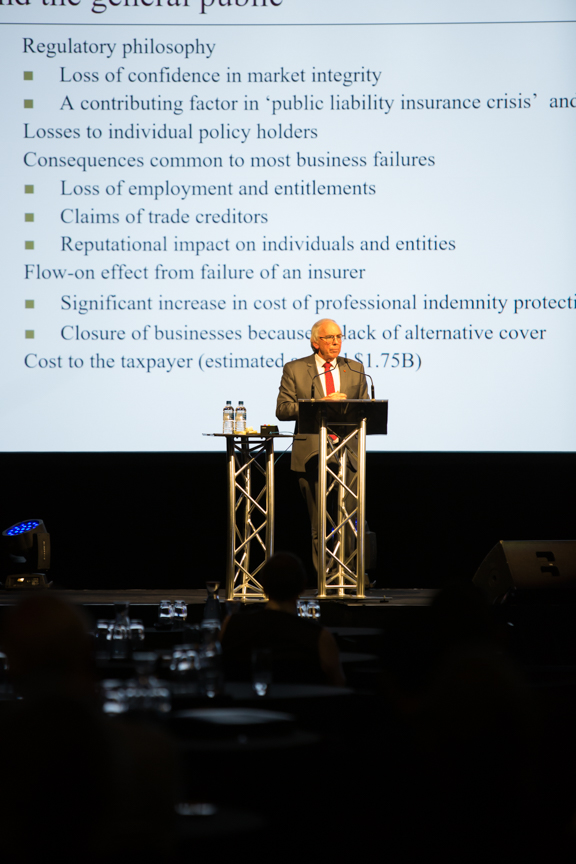Culture is the heart of the problem for financial services: Justice Neville Owen QC. [PRESENTATION]
THE IMPORTANCE OF CULTURE
By Lachlan Colquhoun
Nearly 20 years ago, the Royal Commissioner into the $5 billion collapse of insurer HIH kept asking himself a question as he listened to the evidence: “Did anyone stand back and ask themselves the simple question, is this right?”

In a thought provoking presentation to the FSC Summit 2018, former Royal Commissioner Justice Neville Owen reflected on the enquiry he headed and pondered the similarities with the current Royal Commission into Misconduct in the Banking industry.
“If people were charging services for fees which were never delivered, to people who were dead, did anyone sit back and ask themselves if this was right,” Justice Owen said, referring to the current inquiry.
Like HIH, at the centre of the current Royal Commission are issues of Governance and the terms of reference for both inquiries resonate with each other, both asking if governance is at the root of the problems.
“Culture will eat strategy for breakfast every day, and culture should be at the heart of everything we should be doing,” said Justice Owen.

“The continuation of collapses likes in fiduciaries, all of which relate to culture.
Quoting from Oscar Wilde, who said: “I have the simplest of tastes. I am always satisfied with the best”, Justice Owen listed the governance issues which were at the heart of the HIH collapse, many of which are still highly relevant.
On top of “inadequate risk identification and risk management”, sub standard corporate governance was driven by a private company mentality (although HIH was a public company) where growth was not matched by developments in culture and there was “blind faith” in leaders ill-equipped for the task.
This then created failures to assess the corporate governance model and any conflicts of interest, and flowed through to a lack of skeptical questioning at board level.
“I suggest that some of the lessons which ought to have been learned simply haven’t been,” Justice Owen said.
“Conflict of interests are at the heart of some of the issues we have and they are an exemplar of the problems.”
Justice Owen noted that there had historically been a “ten year cycle” of corporate collapses in Australia, but this was becoming a “five year cycle” which should “be of concern to us all.”
Each collapse brought a slew of new regulation and legislation, which was not succeeding in achieving its purpose.
In the Uniform Companies Act of 1961, which was in place when Justice Owen began his university degree, there were “16 lines” on the duties of directors.
In the Corporations Act of 2001 these were “impossible to count” but Justice Owen questioned whether it was any more effective.
If regulation was not targeted, he said, it could not be the only answer.
The first premise of any solution was to address the “fiduciary concept” of conflict of interest which is “at the heart of officers’ duties.”
On the positive site, the fallout from the HIH Royal Commission was the catalyst for a restructuring of regulator APRA, which had played a role in helping Australia avoid the worst impacts of the Global Financial Crisis.
But recommendations on the independence of auditors were not implemented, and this had led to an ongoing family dispute with Justice Owen’s cousin, who is an auditor.
Family arguments about the role of auditors, which surfaced at family dinners in the aftermath of the HIH collapse, had continued and showed no sign of resolution.
Justice Owen finished his presentation with his “cris de Coeur” which once again came back to culture.
“Your conscience is your first port of call,” he said.
“The only word we need is culture, and culture is an installation of values.”
Justice Owen concluded with some quotes from Socrates, which he called the “Socratic Warning.”
“Regard your good name as the richest jewel you can possibly be possessed of,” he said, quoting the ancient Greek philosopher.
“For credit is like fire. Once you have kindled it you may easily preserve it, but if you once extinguish it you will find it an arduous task to rekindle it again.”


